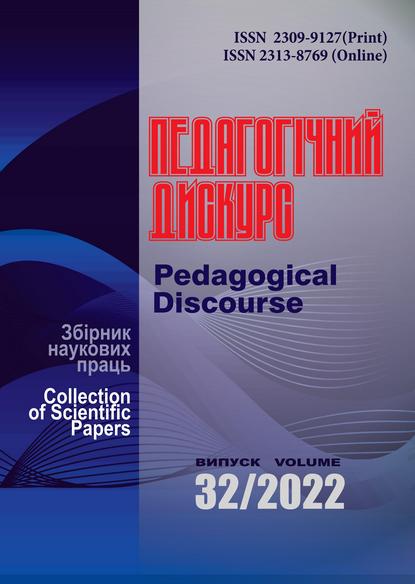І. Yushchuk’s Pedagogical Innovations in the Field of Ukrainian Linguistics (on the Material of the Story «Three on the Moon»)
Abstract
The article analyzes I. Yushchuk’s grammatical fiction novel «The three on the Moon». It is proved that the author offers the reader not only an interesting literary text, but also the opportunity to become an active participant in interesting and fantastic adventures together with the main characters. The peculiarities of all parts in the story are briefly described, which makes it possible to single out the peculiarities of I. Yushchuk’s pedagogical innovation.The methodological innovations that the author used in the work in order to help learners to master the grammatical norms of the Ukrainian language are highlighted. According to the analysis of the story, it is proved that this text is innovative. Arguments proving the innovation of this work are, first, the implementation of the grammatical norms in the artistic text. Secondly, it is the skillful introduction of rules into the dialogues that the story characters exchange. Thirdly, the author supplied the thirty-four chapters with exercises that help the reader to practice the learned rules. Fourth, it is a large amount of interesting material in the story that engages the reader into reading. Last but not least, it is the didactic aspect that characterizes the story «The three on the Moon» and is its focal point. It is emphasized that the story’s interest is not limited to its content. This is a book that will help everyone to understand and learn the rules of the Ukrainian language, as well as consolidate the acquired knowledge in practice by performing exercises followed by keys.The emphasis is placed on the features of sections in the story. The author deliberately left them unfinished. It is this technique that helps the reader to become a full-fledged, fifth, participant in the plot. Performing the tasks of each section, the reader reproduces the encrypted words in the keys and, thus, reproduces the endings of the sections.It is proved that the text-centered approach to the study of the Ukrainian language promotes mastering the language and spelling tasks and distinguishes I. Yushchuk as an innovator in pedagogy.
Downloads
References
Halaievska, L. V. (2017). Tekstotsentrychnyi pidkhid do formuvannia movlennievykh umin i navychok uchniv ta yoho realizatsiia v pidruchnyku ukrainskoi movy [Text-Centric Approach to the Formation of Speech Skills and Abilities of Students and Its Implementation in the Textbook of the Ukrainian Language]. Problemy suchasnoho pidruchnyka – Problems of the Modern Textbook, 19, 68–79 [in Ukrainian].
Holub, N. B. (2017). Robota z tekstamy na urokakh ukrainskoi movy u protsesi vyvchennia syntaksysu i punktuatsii u 8-9 klasakh [Working with Texts in Ukrainian Language Lessons in the Process of Learning Syntax and Punctuation in Grades 8–9]. Ukrainska mova i literatura v shkolі – Ukrainian Language and Literature at School, 1, 2–8 [in Ukrainian].
Omelchuk, S. A. (2018). Novatorstvo I. Yushchuka v ukrainskii linhvodydaktytsi kintsia ХХ – pochatku ХІХ storichchia [Ivan Yushchuk’s Innovations in Ukrainian Linguodidactics of the Late XX – Early XXI Centuries]. Dyvoslovo – Dyvoslovo, 10, 36–42 [in Ukrainian].
Pentyliuk, M. I. (2011). Tekstotsentrychnyi aspekt formuvannia rytorychnykh umin i navychok [Text-Centric Aspect of the Formation of Rhetorical Skills]. Aktualni problemy suchasnoi linhvodydaktyky – Actual Problems of Modern Linguodidactics, 96–108 [in Ukrainian].
Yushchuk, I. (1998). Prohramy dlia serednoi zahalnoosvitnoi shkoly. Ridna mova: 5-11 klasy [Programs for Secondary School. Native Language: Grades 5–11]. Kyiv: Perun [in Ukrainian].
Rybalchenko, A. M. (2020). Pedahohichna innovatsiia yak prohresyvna zmina v osviti [Pedagogical Innovation as a Progressive Change in Education]. Suchasni vyklyky i aktualni problemy nauky, osvity ta vyrobnytstva: mizhhaluzevi dysputy – Modern Challenges and Current Problems of Science, Education and Production: Intersectoral Disputes. Abstracts of Papers of II International Scientific and Practical Internet Conference. (p. 74–78). Kyiv: Open Sciense Laboratory–naukova platform. [in Ukrainian].
Khomiak, I. M. (2012). Metodyka formuvannia orfohrafichnykh umin i navychok [Methods of Forming Spelling Skills]. Dyvoslovо – Dyvoslovo, 3, 41–50 [in Ukrainian].
Yushchuk, I. P. (1967). Vyvchennia vidmin imennykiv [Study of Noun Cases]. Ukrainska mova i literatura v shkoli – Ukrainian Language and Literature at School, 12, 53–64 [in Ukrainian].
Yushchuk, I. P. (2005). Vyvchennia chyslivnyka v 6 klasi [Study of Numerals in 6th Grade]. Dyvoslovо – Dyvoslovo, 1, 14–19 [in Ukrainian].
Yushchuk, I. P. (2007). Naukovi zasady vyvchennia fonetyky u shkoli [Scientific Principles of Studying Phonetics at School]. Dyvoslovo – Dyvoslovo, 10, 8–13 [in Ukrainian].
Yushchuk, I. P. (2010). Troie na Misiatsi [Three on the Moon]. Kyiv: Hrani-T. [in Ukrainian].
Yushchuk, I. P. (2013). Ukrainska mova v shkoli: metodychni porady dlia vchytelia [Ukrainian Language at School: Methodical Advice for Teachers]. Ternopil: Navchalna knyha–Bohdan. [in Ukrainian].
Yushchuk, I. P. (2021). Khudozhnii tekst u vyvchenni movy [Artistic Text in Language Learning]. Dyvoslovo – Dyvoslovo, 4, 2–3 [in Ukrainian].
Copyright (c) 2022 Pedagogical Discourse

This work is licensed under a Creative Commons Attribution-NonCommercial-ShareAlike 4.0 International License.

















